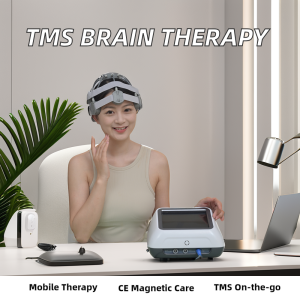In the ever-evolving landscape of medical technology, Transcranial Magnetic Stimulation (TMS) has emerged as a groundbreaking innovation, offering new hope for patients suffering from a range of neurological and psychiatric disorders. This non-invasive procedure has revolutionized the way we approach treatment, providing a safe and effective alternative to traditional methods.
How Does TMS Work?
At its core, TMS is based on the principle of electromagnetic induction. A magnetic coil, placed on the scalp, generates brief, powerful magnetic pulses. These pulses can penetrate the skull and induce small electric currents in the underlying brain tissue. These currents then stimulate or inhibit neural activity in specific regions of the brain, depending on the parameters of the stimulation. This targeted approach allows for precise modulation of brain function, making TMS a highly customizable treatment option.
Core Technology and Precision
The technology behind TMS has seen significant advancements over the years. Modern TMS devices, such as the CE-certified TMS equipment, are designed with state-of-the-art features to ensure accurate and consistent stimulation. The coils are engineered to deliver magnetic fields with high spatial resolution, allowing for targeted treatment of specific brain areas. Additionally, the ability to adjust parameters such as frequency, intensity, and pulse duration gives healthcare providers the flexibility to tailor the treatment to each patient’s unique needs.
Treating a Variety of Conditions
TMS has shown remarkable efficacy in treating a wide range of conditions. One of the most well-studied applications is in the treatment of depression. For patients who have not responded to traditional antidepressant medications, TMS offers a new ray of hope. By stimulating the dorsolateral prefrontal cortex, a region of the brain known to be involved in mood regulation, TMS can help alleviate symptoms of depression and improve overall quality of life.

In addition to depression, TMS has also been found to be effective in treating conditions such as obsessive-compulsive disorder (OCD), anxiety disorders, and even some neurological conditions like stroke rehabilitation and chronic pain. The ability to modulate neural activity in specific brain regions makes TMS a versatile tool in the medical practitioner’s arsenal.
Who Can Benefit from TMS?
TMS is suitable for a diverse range of patients. It is particularly beneficial for those who have not achieved satisfactory results with traditional treatments, or for those who experience intolerable side effects from medications. Since TMS is non-invasive and does not require anesthesia, it is generally well-tolerated by patients. However, as with any medical procedure, it is important to consult with a healthcare provider to determine if TMS is the right option for you.
The Benefits of Weak Magnetic Transcranial Magnetic Stimulation
Weak magnetic TMS, in particular, offers several advantages. It is a gentle form of stimulation that can be effective in promoting neural plasticity and enhancing cognitive function. This makes it a promising option for patients with conditions such as mild cognitive impairment or traumatic brain injury. Additionally, weak magnetic TMS may have fewer side effects compared to more intense forms of stimulation, making it a more comfortable option for some patients.
QIJIA: A Trusted Manufacturer
When it comes to TMS/RTMS machine factory wholesale price, QIJIA stands out as a leading manufacturer. Their commitment to quality and innovation is evident in the design and production of their TMS equipment. QIJIA’s products are not only CE-certified, ensuring compliance with international safety and quality standards, but also offer advanced features and reliable performance. Whether you are a healthcare provider looking to incorporate TMS into your practice or a patient interested in exploring this treatment option, QIJIA’s products are worth considering.
Conclusion
In conclusion, Transcranial Magnetic Stimulation has emerged as a powerful tool in the treatment of various neurological and psychiatric conditions. With its non-invasive nature, precise targeting capabilities, and growing body of evidence supporting its efficacy, TMS is changing the lives of patients around the world. As technology continues to advance, we can expect to see even more innovative applications of TMS in the future.
Numerous international studies have demonstrated the effectiveness of TMS. For example, a meta-analysis published in a leading medical journal found that TMS was significantly more effective than sham treatment in reducing depressive symptoms in patients with treatment-resistant depression. Another study showed that TMS could improve motor function in stroke patients, highlighting its potential in neurological rehabilitation. These findings, along with many others, provide strong evidence for the use of TMS as a viable treatment option.
Contact information:
WhatsApp: +44 7410558633
The email address:[email protected]/[email protected]
Raised between Amman and Abu Dhabi, Farah is an electrical engineer who swapped circuit boards for keyboards. She’s covered subjects from AI ethics to desert gardening and loves translating tech jargon into human language. Farah recharges by composing oud melodies and trying every new bubble-tea flavor she finds.
0 Comments